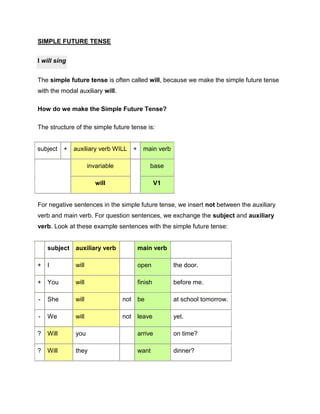
Simple future tense
- 1. SIMPLE FUTURE TENSE<br />I will sing<br />The simple future tense is often called will, because we make the simple future tense with the modal auxiliary will.<br />How do we make the Simple Future Tense?<br />The structure of the simple future tense is:<br />subject+auxiliary verb WILL+main verbinvariablebasewillV1<br />For negative sentences in the simple future tense, we insert not between the auxiliary verb and main verb. For question sentences, we exchange the subject and auxiliary verb. Look at these example sentences with the simple future tense:<br /> subjectauxiliary verbmain verb +Iwill openthe door.+Youwill finishbefore me.-Shewillnotbeat school tomorrow.-Wewillnotleaveyet.?Willyou arriveon time??Willthey wantdinner?<br />When we use the simple future tense in speaking, we often contract the subject and auxiliary verb:<br />I willI'llyou willyou'llhe willshe willit willhe'llshe'llit'llwe willwe'llthey willthey'll<br />For negative sentences in the simple future tense, we contract with won't, like this:<br />I will notI won'tyou will notyou won'the will notshe will notit will nothe won'tshe won'tit won'twe will notwe won'tthey will notthey won't<br />How do we use the Simple Future Tense?<br />No Plan<br />We use the simple future tense when there is no plan or decision to do something before we speak. We make the decision spontaneously at the time of speaking. Look at these examples:<br />Hold on. I'll get a pen.<br />We will see what we can do to help you.<br />Maybe we'll stay in and watch television tonight.<br />In these examples, we had no firm plan before speaking. The decision is made at the time of speaking.<br />We often use the simple future tense with the verb to think before it:<br />I think I'll go to the gym tomorrow.<br />I think I will have a holiday next year.<br />I don't think I'll buy that car.<br />Prediction<br />We often use the simple future tense to make a prediction about the future. Again, there is no firm plan. We are saying what we think will happen. Here are some examples:<br />It will rain tomorrow.<br />People won't go to Jupiter before the 22nd century.<br />Who do you think will get the job?<br />Be<br />When the main verb is be, we can use the simple future tense even if we have a firm plan or decision before speaking. Examples:<br />I'll be in London tomorrow.<br />I'm going shopping. I won't be very long.<br />Will you be at work tomorrow?<br />Note that when we have a plan or intention to do something in the future, we usually use other tenses or expressions, such as the present continuous tense or going to.<br />
